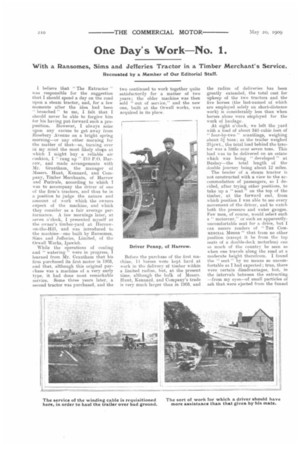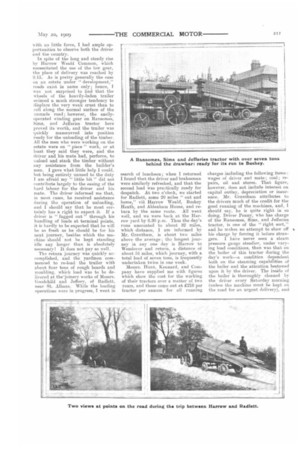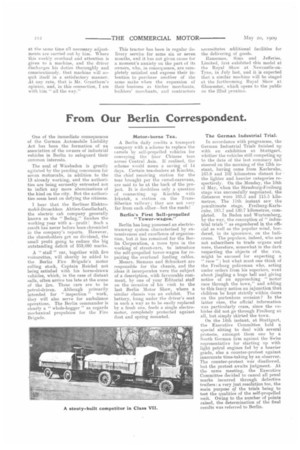One Day's Work No. 1.
Page 2

Page 3

Page 4

If you've noticed an error in this article please click here to report it so we can fix it.
With a Ran somes, Sims and Jefferies Tractor in a, Timber Merchant's Service.
Recouated by a Member of Our Editorial Staff.
1 believe that " The Extractor was responsible for the suggestion that I should spend a day on the road upon a steam tractor, and, for a few moments after the idea had been " broached " to me, I felt that I should never be able to forgive him for his having put forward such a proposition, However, I always seize upon any excuse to get away from ltosebery Avenue on a bright spring morning—or any other morning for the matter of that—so, turning over in my mind the most likely shops at which I might buy a reliable air cushion, I " rang up " 210 P.O. liarrow, and made arrangements with Mr. Grantham, the manager of Messrs. Hunt, Kennard, and Company, Timber Merchants, of Harrow and Perivale, according to which I was to accompany the driver of one of the firm's tractors, and thus be in a position to judge the nature and amount of work which the owners expect of the machine, and which they consider as a fair average performance. A. few mornings later, at seven o'clock, I presented myself at the owner's timber-yard at Harrowon-the-Hill, and was introduced to the machine—one built by Ilansomes, Sims and Jefferies. Limited, of the Orwell Works, Ipswich.
While the operations of coaling and " watering " were in progress, I learned from Mr. Grantham that his firm purchased its first motor in 1903, and that, although this original purchase was a machine of a very early type, it had done most remarkable service. Some three years later, a second tractor was purchased, and the two continued to work together quite satisfactorily for a matter of two years; the older machine was then sold " out of service," and the new one, built at the Orwell works, was acquired in its place.
Before the purchase of the first machine, 14 horses were kept hard at work in the delivery of timber within a limited radius, but, at the present time, although the bulk of Messrs. Hunt, Kennard, and Company's trade is very much larger than in 1903, and the radius of deliveries has been greatly extended, the total cost for upkeep of the two tractors and the five horses (the last-named of which are employed solely on short-distance work) is considerably less than when horses alone were employed for the work of haulage.
At eight o'clock, we left the yard with a load of about 340 cubic feet of " four-by-two " scantlings, weighing about 5t tons ; as the trailer weighed 25cwt., the total load behind the tractor was a little over seven tons_ This load was to be delivered on an estate which was being " developed " at Bushey—the total length of the double journey being about 12 miles.
The tender of a steam tractor is not constructed with a view to the accommodation of passengers, so I decided, after trying other positions, to take up a " seat " on the top of the timber, at the forward end, from which position I was able to see every movement of the driver, and to watch both the pressure and water gauges. Few men, of course, would select such a " motorcar," or such an apparently. uncomfortable seat for a drive, but I can assure readers of " THE COMMERCIAL MOTOR " that from no other position (except it be from the top seats of a double-deck motorbus) eau so much of the country be seen as when one travels along the road at a moderate height therefrom. I found the " seat " by no means so uncomfortable as I had expected ; true, there were certain disadvantages, but, in the intervals between the extracting —from my eyes—of small particles of ash that were ejected from the funnel
with no little force, I had ample opportunities to observe both the driver and the country.
In spite of the long and steady rise by Barrow Weald Common, which necessitated the use of the low gear, the place of delivery was reached by 9.15. As is pretty generally the case on an estate under "development," roads exist in name only; hence, I was not surprised to find that the wheels of the heavily-laden trailer evinced a much stronger tendency to displace the very weak crust than to roll along the normal surface of the unmade road; however, the easilyoperated winding gear on Ransomes, Sims, and Jefferies tractor here proved its worth, and the trailer was quickly manceuvred into position ready for the unloading of the timber. All the men who were working on the estate were on " piece " work, or at least they said they were, and the driver and his mate had, perforce, to unload and at, Plc the timber without any assistance from the builder's men. I gave what little help I could, but being entirely unused to the duty I am afraid my " little hit" did not contribute largely to the easing of the hard labour for the driver and his mate. The driver informed me that, in most cases, he received assistance during the operation of unloading, and I should say that he most certainly has a right to expect it. If a driver is" fagged out" through his handling of loads at terminal points, it is hardly to be expected that he will be as fresh as he should be for his next journey, besides which the machine should not be kept standing idle any longer than is absolutely necessary! It does not pay so well.
Ths return journey was quickly accomplished, and the yardmen commenced to re-load the trailer with about four tons of rough boards and moulding, which load was to be delivered at the'joinery works of Messrs. Goodchild and Jeffery, of Radlett, near St. Albans. While the loading operations were in progress, I went in
search of luncheon; when I returned I found that the driver and brakesman were similarly refreshed, and that the second load was practically ready for despatch. At two o'clock, we started for Radlett, some 20 miles " out and home," via Harrow Weald, Bushey Heath, and Aldenham House, and return by the same route. All went well, and we were back at the Harrow yard by 6.30 p.m. Thus the day's runs amounted to about 32 miles, which distance, I am informed by Mr. Grantham, is about two miles above the average; the longest journey in any one day is Harrow to Wendover and return, a distance of about 54 miles, which journey, with a total load of seven tons, is frequently undertaken twice in one week.
Messrs. Hunt, Kennard, and Company have supplied me with figures which show the cost for the working of their tractors over a matter of two years, and these come out at 216 per tractor per annum for all running
charges including the following items: wages of driver and mate; coal; repairs, oil and stores. That figure, however, does not include interest on capital outlay, depreciation or insurance. Mr. Grantham attributes to the drivers much of the credit for the good running of the machines, and, I should say, he is quite right in so doing. Driver Penny, who has charge of the Ransomes, Sims, and Jefferies tractor, is one of the "right sort," and he makes no attempt to show off his charge by forcing it before strangers. I have never seen a. steam pressure gauge steadier, under varying load conditions, than was that on the boiler of this tractor during the day's work—a condition dependent both on the steaming capabilities of the boiler and the attention bestowed upon it by the driver. The inside of the boiler is thoroughly cleaned by the driver every Saturday morning (unless the machine must be kept on the road for an urgent delivery), and at the same time all necessary adjustments are carried out by him. Where this weekly overhaul and attention is given to a machine, and the driver discharges his duties thoroughly and conscientiously, that machine will acquit itself in a satisfactory manner_ At any rate, that is Mr. Grantham's opinion, and, in this connection, I am with him " all the war." This tractor has been in regular delivery service for some six or seven months, and it has not given cause for a moment's anxiety on the part of its owners, who, in consequence, are completely satisfied and express their intention to purchase another of the same make when the expansion of their business as timber merchants, builders' merchants, and contractors necessitates additional facilities for the delivering of goods.
Ransomes, Sims and Jefferies, Limited, first exhibited this model at the Royal Show at Newcastle-onTyne, in July last, and it is expected that a similar machine will be staged at the forthcoming Royal Show at Gloucester, which opens to the public on the 22nd proximo.




















